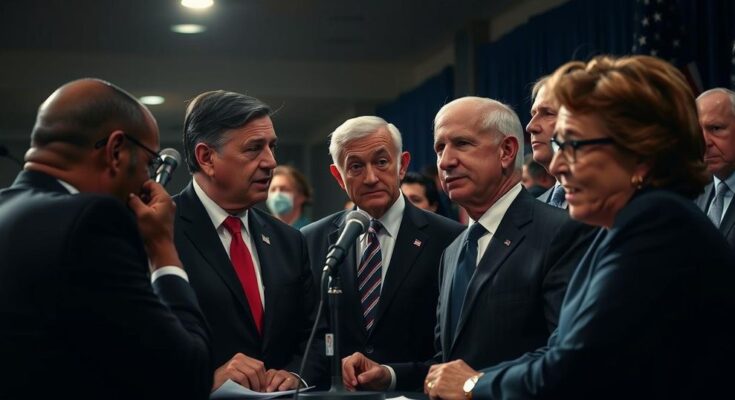Nearly a month after a significant electoral defeat, the Democratic Party remains divided regarding the seriousness of its political issues. While some leaders downplay the implications of Donald Trump’s victory, others assert an urgent need for an overhaul of the party’s brand and strategy. Key figures like Senator Bernie Sanders highlight the party’s disconnect with working-class voters, raising concerns about future electoral viability.
In the aftermath of a particularly challenging election, the Democratic Party finds itself grappling with significant internal divisions regarding the nature and severity of its political predicament. Following the election, there are varying perspectives among Democratic leaders about the implications of Donald Trump’s victory against Vice President Kamala Harris. Some stakeholders perceive the electoral outcome as a mere reflection of broader anti-incumbent sentiments driven by inflation, while others assert the necessity for an urgent reevaluation of the party’s messaging, strategy, and policies.
Trump’s successful campaign has raised concerns as he garnered support from key battleground states and became the first Republican in nearly two decades to secure the national popular vote. Despite the apparent electoral success, nearly half of the electorate voted against him, illustrating an ongoing dissonance among voters. Colorado Governor Jared Polis articulated a hopeful view, stating, “The glass is half full. It was close. If we get another 2% or 3% of American voters, it would have successfully led to victories from the presidency on down.” However, the chair of the Minnesota Democratic-Labor-Farmer Party, Ken Martin, expressed a more critical stance, suggesting that the party has lost touch with the working-class demographic.
As the party contemplates its future, internal debates loom over the leadership and strategic direction required to organize against Trump’s anticipated agenda, which includes significant policy shifts that may adversely impact the economy and civil liberties. Democratic leaders are currently conducting analyses to understand the electoral failures of their recent campaign, though collaboration across factions appears limited as differing opinions may lead to fragmented responses.
Several key figures within the Democratic Party, like Senator Bernie Sanders and Representative Ro Khanna, have voiced the need for profound reforms, with Sanders asserting that the party’s disconnect from the working-class has led to significant electoral losses. He stated, “It should come as no great surprise that a Democratic Party which has abandoned working-class people would find that the working class has abandoned them,” emphasizing the urgency for change.
The upcoming election of a new chair for the Democratic National Committee (DNC) will serve as an important indicator of the party’s strategic alignment moving forward. Candidates, including Wisconsin Democratic Party Chair Ben Wikler, are advocating for a revised communication strategy aimed at re-engaging with voters who typically abstain from political discussions. While some leaders remain cautiously optimistic about regaining ground, there is a palpable uncertainty regarding the collective ability of the party to unify and effectively address its core challenges.
The Democratic Party is currently facing a precarious moment after suffering a significant defeat in the elections. This loss has prompted a serious examination of the party’s identity, messaging, and platforms. With Donald Trump emerging victoriously and riding a wave of support from battleground states, there is a pressing need for the Democrats to assess their failure to connect with critical voter demographics, particularly the working class and young voters. As they navigate these internal disputes, the DNC’s upcoming leadership election becomes a pivotal point for potential ideological shifts within the party. This tumultuous environment has further complicated the Democrats’ ability to present a united front against Trump and his policy agenda.
In summary, the Democratic Party is at a crossroads following a disappointing electoral outcome, leading to intense discussions regarding the nature of their challenges. Disagreement among party leaders about the severity of their situation could hinder their capacity to strategize effectively for future elections. Calls for significant reforms from progressive members signal a growing divide within the party, as they attempt to reconcile their message and policies with the needs of their voter base. The upcoming DNC leadership election will be critical for determining the party’s path forward as it seeks to regain relevance in a politically shifting landscape.
Original Source: abcnews.go.com




